Bobby Sherman was one of the biggest music stars during the 1960s and 1970s. Back then, it seemed like everyone had a crush on him.
He released several albums, became a well-known actor, performed for thousands of fans, and sold millions of records. But even with all his success, Sherman made the surprising decision to leave show business for good while he was still famous.
It wasn’t because he felt like he wasn’t talented anymore. Instead, he left for a bigger purpose—he wanted to save lives.
Here’s everything you need to know about the legendary Bobby Sherman!

Bobby Sherman was born on July 22, 1943, in Santa Monica, California, and grew up in Van Nuys, near Los Angeles.
**Bobby Sherman – Early Life**
By the time he was 11, Sherman had learned to play the trumpet and later mastered other instruments like the piano, trombone, and guitar. He attended Birmingham High School, where he joined a band and developed a strong interest in singing. Over the years, Sherman reportedly learned to play an impressive 16 instruments.
After graduating high school in 1961, he began studying at Pierce College in Woodland Hills, near Los Angeles. It was during this time that a relationship changed his life forever.
Sherman was studying child psychology at Pierce College when he met his first girlfriend. One night, she invited him to a cast party for *The Greatest Story Ever Told*.
By then, Sherman had already started performing music with different bands around the San Fernando Valley, and many people recognized his talent. At the party, Sherman didn’t hesitate to showcase his voice.
“I was always the guy who had the gumption to get up and sing in front of people,” he later said.
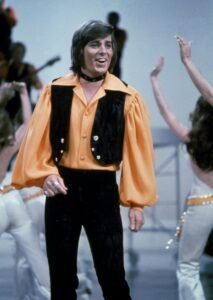
At the Hollywood party, Bobby Sherman had some friends playing in the band on stage, which made it easier for him to get up and sing. He performed Ray Charles’ “What I’d Say” in front of the crowd.
**Discovered at a Hollywood Party**
Since it was a Hollywood party, many famous people from the entertainment industry were there, including stars like Sal Mineo, Natalie Wood, and Jane Fonda.
After his performance, they recognized his talent. Sal Mineo, especially, took notice and decided to mentor him.
“People were saying things like, ‘Who’s handling you?’ I had no idea what that meant,” Sherman recalled.
“Well, I was just a kid from Van Nuys, and I was like, ‘What do they mean, handling me?’ Then I realized they were talking about representation.”
Sherman quickly got a taste of Hollywood life. Just three days later, an agent—who had heard about him from one of the party guests—sent him to an audition. It was for a new television show called *Shindig*, and Bobby landed a featured role.
His time on *Shindig* lasted only two years, but that was enough to get him noticed. By then, people across the country had fallen in love with him, and job offers started pouring in.
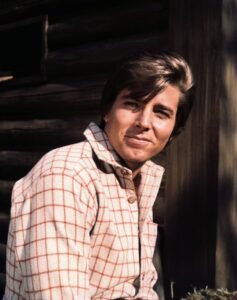
When *Shindig* was canceled in 1966, Bobby Sherman guest-starred on several other shows, including *The Monkees*, *Honey West*, and *The FBI*. He was starting to become a heartthrob in Hollywood, but it was in 1968 that he really made it big.
**Bobby Sherman – Music, Songs, Albums, Acting**
Sherman played the stuttering character Jason Bolt in *Here Come The Brides*, staying on the show for two full years. By the end of his time on the show, his character had lost his stutter, but the show was eventually canceled.
Jason Bolt became very popular with fans, and Sherman realized this during a telethon in Buffalo. Suddenly, he wasn’t just a rising star; he had become famous.
“The show had just started, and we didn’t even have any records out yet,” Sherman told *Tulsa World*.
“Greg Morris from *Mission: Impossible* and Robert Brown from *Here Come The Brides* and I were asked to do the telethon. It was going really well when the fire marshal came in and said, ‘We have a problem. You need to come up to the second floor; you have to greet some people.’
“They opened up a window, and I looked out to see the parking lot of the TV station filled with people. It was a sea of faces,” he recalled. “It was just unbelievable. That was when I realized something big was happening.”
The following year was a bit of a “limbo” for Bobby. However, it was during this time that he began focusing on writing songs and experimenting with his eight-track recording equipment.

Bobby Sherman became a professional singer, even though he hadn’t received much recognition for his voice yet.
**Bobby Sherman – Family, Wife, Children**
From 1969 to 1971, Sherman’s young fans bought millions of his recordings. He released popular singles like “Little Woman,” “Easy Come, Easy Go,” and “Julie, Do Ya Love Me.” He sold over a million copies of six different singles and four different albums.
“A song begins with an idea – one line,” he explained in 1971. “I build that into a complete lyric. Then, I fit the music around it.”
Sherman starred in a television series called *Getting Together*, a spinoff of *The Partridge Family*, about two songwriters, from 1970 to 1971. He also appeared in several guest roles after that.
At the same time as his rise to fame, he married his first wife, Patti Carnel, in 1971. Together, they had two sons, Christopher and Tyler.
Sherman wanted his kids to have a great place to grow up, so he decided to build a miniature model of Disneyland’s Main Street in his backyard. The project cost him about $15,000 and took around two and a half years to complete.
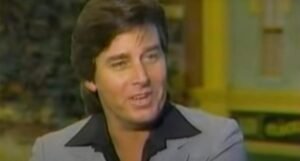
Not everyone was happy with Bobby Sherman’s Disneyland project; his wife was reportedly annoyed by the constant noise of hammers.
**”I Didn’t Know What Home Was”**
“At one point, she said, ‘If you don’t finish it, I’ll kill you,’” Sherman joked in an interview with *People*.
Bobby’s children not only inspired him to build his own piece of Disneyland but also became the motivation for his new career. He became a major teen heartthrob before stars like Shaun Cassidy and David Cassidy. Eventually, he was “replaced” by performers like Donny Osmond.
At the height of his career, Sherman starred in hit television series while also releasing popular singles, gaining adoration from millions of fans. His albums *Sixteen* and *Tiger Beat* became two of his most cherished works.
Even though he was living out his dream, Sherman explained that he often filmed five days a week and had evening shows on weekends. This busy schedule took a toll on him. “It was so hectic for three years that I didn’t know what home was,” he told the *Washington Post*.
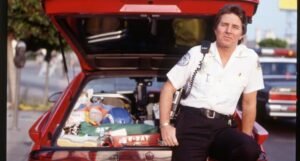
“I was disoriented; I never knew where I was. I always had to be reminded. But, in all honesty, I must say I had the best of times because the concerts were great, and the fans were great. It was the proverbial love-in, but it just zapped so much out of me.”
**Bobby Sherman Left Music to Save Lives**
Then, in the middle of his celebrity status, Bobby suddenly decided to switch careers to a very important one. He chose to leave his music and television career to save lives.
Sherman was very involved in raising his children, and his then-wife Patti was afraid of blood. As anyone who has raised kids knows, accidents happen often, and Christopher and Tyler would sometimes fall and get hurt.
These falls sometimes caused bloody knees and other minor scrapes. Wanting to handle these situations better, Sherman decided to take some classes. He first took an introductory first aid and CPR class and later volunteered as an emergency medical technician.
“The very first call, I saved a little 5-year-old girl’s life. I thought, ‘Yeah, that’s the most incredible feeling,’” Bobby recalled in a 1994 interview.
Frank Fritz, “American Pickers” star, dead at 60 — rest in peace
Fans are devastated at the news that Frank Fritz, the antiques expert who gained fame on the reality series American Pickers, has died at 60.
Fritz, who left the series in 2021, had been suffering from health problems and was hospitalized from a stroke two years ago.

The news was announced by Fritz’s friend and co-star Mike Wolfe, who said that Fritz passed away last night.
“I’ve know Frank for more [than] half my life and what you’ve seen on TV has always been what I have seen, a dreamer who was just as sensitive as he was funny,” Wolfe wrote in a social media tribute. “The same off camera as he was on, Frank had a way of reaching the hearts of so many by just being himself.”
Fritz and Wolfe gained fame as the hosts of the reality TV series American Pickers, which premiered on the History Channel in 2010. The series showed the two “pickers” traveling across the USA, searching for valuable antiques and collectibles in unexpected places.

“We’re looking for amazing things buried in people’s garages and barns,” the show’s opening narration explains. “What most people see as junk, we see as dollar signs. We’ll buy anything we think we can make a buck on.”
“We make a living telling the history of America… one piece at a time.”
The series attracted millions of viewers, becoming one of History Channel’s most popular programs. In its debut year it was the #1 non-fiction series among total viewers and adults 25-54.
While the antiques were often interesting, there’s no doubt it was the chemistry and charisma of the two hosts that kept viewers coming back for more.
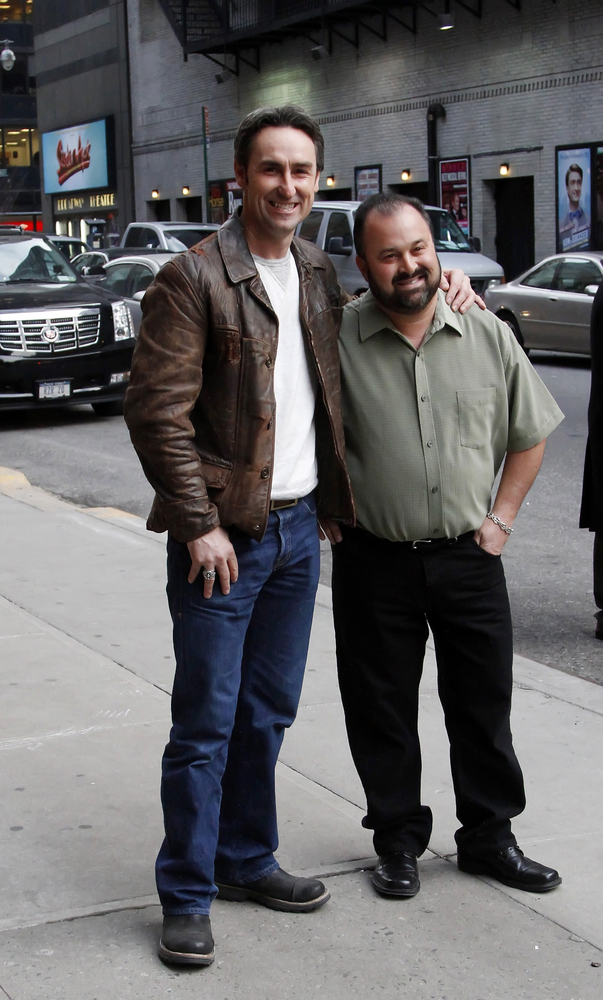
In 2021, it was announced that Fritz would be leaving American Pickers after a decade on the hit series. Fritz said the decision was not his own, and that he was pushed out by the network after a back surgery.
“I didn’t leave the show,” he told The Sun at the time. “I finished shooting and then I had a little back surgery and the pandemic came.”
He also suggested that his co-host’s ego was a factor, saying the show had “tilted towards him 1,000 percent.” “I haven’t talked to Mike in two years,” Fritz said. “He knew my back was messed up, but he didn’t call me up and ask how I was doing. That’s just how it is.”

In July 2022, Fritz was hospitalized from a stroke. In 2023, he had a tearful reunion with Mike Wolfe, and the two resolved their purported feud. However, Fritz declined an offer to rejoin American Pickers, deciding to focus on his health.
It’s clear that the two former co-hosts have remained friendly since then, and it seems Wolfe was by his side til the end.
“We’ve been on countless trips and shared so many miles and I feel blessed that I was there by his side when he took one last journey home,” Wolfe wrote on Instagram. “I love you buddy and will miss you so much I know [you’re] in a better place.”
American Pickers remains a staple of the History Channel lineup. Fritz has never officially been replaced as co-host, though series regulars like Danielle Colby, Mike Wolfe’s brother Robbie, and friend and antiques expert “Jersey Jon” Szalay will rotate accompanying Wolfe on his antiquing trips.
Colby also shared her own tribute to Fritz on social media. “Frank, I will miss your ability to make everyone laugh, your love for talking tattoos, your epic collections but what I will miss the most are those little glimpses of vulnerability from time to time,” she wrote.
“Frank, you loved your cat and your momma and we bonded on those things. You will be missed for all of these reasons and so many more.
Rest in Peace Road Dog.”
Rest in peace to the iconic reality TV star Frank Fritz 😢🙏 Please share this story in his memory.



Leave a Reply